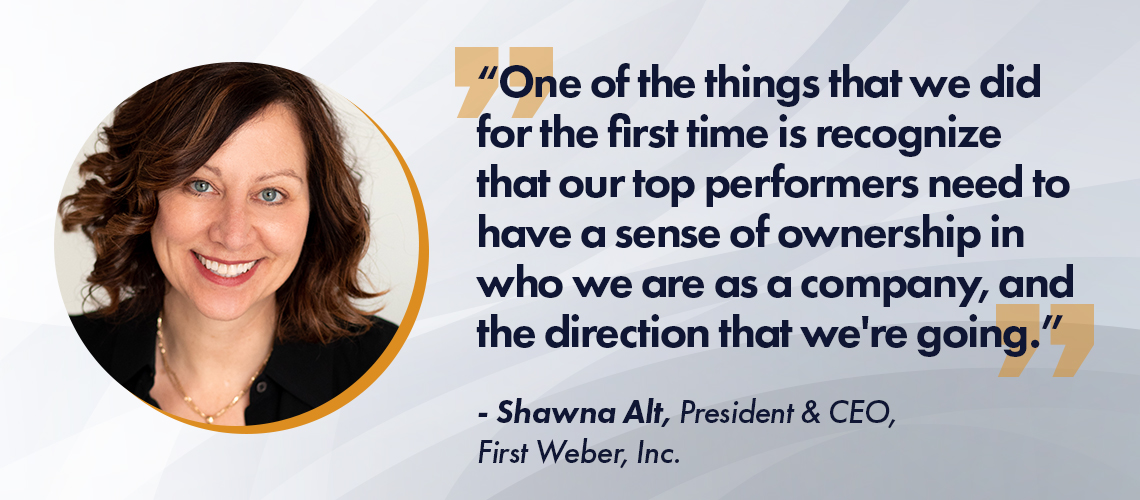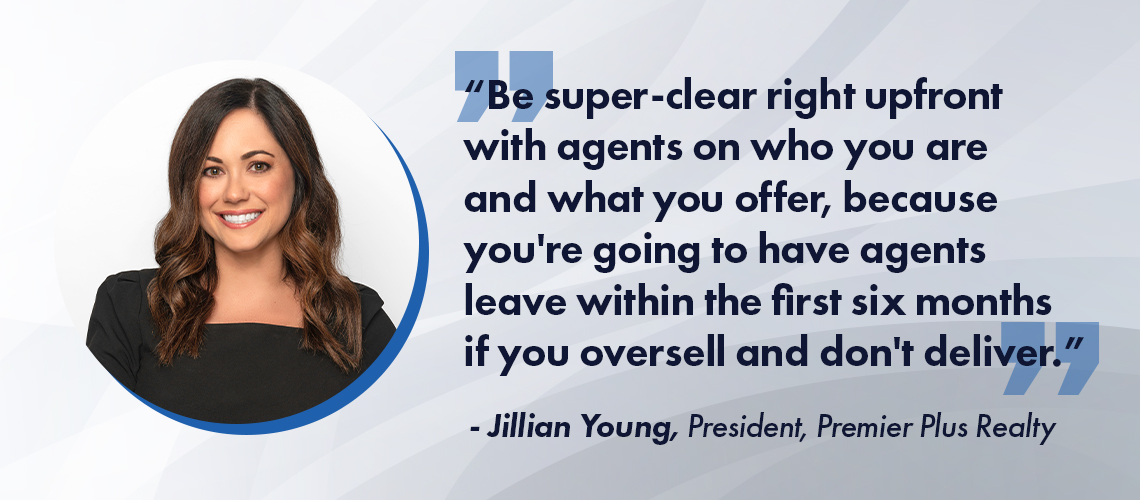
Above Left to Right: Shawna Alt, Boomer Foster, Christina Pappas, Jillian Young
Agents are looking for a lot more than a paycheck these days when it comes to finding a brokerage to call home. But of course, like most everyone else, the bottom line for where they are happy to work relates directly to their own bottom line. From training to technology, there are many variables for what matters most to today’s top agents, and brokerages must offer compensation structures that keep agents incentivized, happy and loyal.
“We’ve spent two years in the virtual world, and many agents have adapted to technology allowing them not to come into the office and truly connect,” says Christina Pappas, president of The Keyes Company in Miami, Florida. “It can affect what they’re looking for in a company, and may have changed their values. What brokers are doing today to show value to their agents and how they’re recruiting, along with retention and development, are crucial for success in this year and beyond.”
REALTORS® working remotely when not at houses with buyer/seller clients has had an impact on residential real estate businesses in terms of office interactions and other factors. There may or may not be any going back to the way it was before COVID. Whether that’s good, bad or somewhere in between is for brokerage owners to decide for themselves.
“One of the big challenges I think we’ve all faced, and it’s not just since COVID, is having agents come back into the office,” reports Boomer Foster, former president of Long & Foster Real Estate in Leesburg, Virginia. “When I was selling a decade and a half ago, we had these vibrant, high-energy offices where people were in all the time. And a big reason for that was because of, for the most part, the limited technology back then. We would wait for fax machines. We didn’t have digital signatures, so we had to meet clients face to face in the offices.
“The net effect of people in the office was that there was high energy, there was time to socialize, and time to network and learn from your peers,” says Foster. “We can blame it on COVID, but if you go into most real estate offices, they’re almost always empty, except for whatever meeting day they’re having. Agents can do every bit of their business from their phone. Technology has gotten to the point where we’re just completely mobile and virtual but can still be effective.”
Foster admits to being a little “old-school” regarding having agents interact at least part of the time, so his company has initiated measures to make it so.
“We’re being very intentional about giving agents a reason to get back in the office or back together in some form,” he says. “We’re doing things like work from the office Wednesdays, serving lunch and bringing agents together in person, talking about what works and learning from each other. It’s about being part of something bigger than you, being able to enjoy the people you’re around and that you work with, learning from them and really being happy at work.”
Foster adds that there is an emphasis for office leaders to make concerted efforts to be in touch with all agents in this relatively new remote work environment.
“You used to be able to manage agents just by walking around because everybody would be in the office, but that’s in the past now, so we have to be very intentional on that front,” he says. “Reaching out, making sure we’re checking in with our people, making sure they know we care about them both personally and professionally. That’s awfully important because if we forget about them, somebody else at another company is not forgetting about them.”
Making Earning Easier for Agents
The residential real estate industry differs from most professions because agents earn every dollar through sales commissions. There are no big salaries to entice people to move from one place to the other. Top agents are going to make their money regardless of which brokerage they align with. Their talent wins out. Therefore, it’s incumbent upon brokerages to ensure they’re doing the things that employees in demand want.

Shawna Alt, president and CEO of First Weber, Inc. in Madison, Wisconsin, explains that “our role now as leaders is to create moments, not meetings. We can get meeting information off the internet, off Google, but creating moments and things that bring us together that help reinforce team and culture is a No. 1 priority for us. One of the things that we did for the first time is recognize that our top performers need to have a sense of ownership in who we are as a company, and the direction that we’re going.
“So we took that group, along with our leadership team, offsite for two days and did a series of activities for leadership training,” Alt explains. “Then we went through something called radical candor, and we asked four questions: What’s working? What’s not working? Where do you need more support? What else do you want to talk about? It was complete and total transparency, everything from our financials to our thought processes of where we’re going and what it is that we’re trying to achieve. All the skeletons in the closet got thrown on the table. We had an amazing discussion, and we’re very excited to roll out what our new initiatives are around that. Hopefully our agents are feeling like they’re heard, and now they’re going to see something concrete from those conversations.”
‘Under-Promise and Over-Deliver’
Jillian Young, president of Premier Plus Realty in Bonita Springs, Florida, stresses that brokerages need to show their true colors to agents, the ones currently on the roster and the ones they’re trying to recruit.
“Agents can sniff insincerity, and the way you hire your staff has to just live and breathe whatever you decide is your sweet spot of core values,” she says. “Bringing your team into the planning process is key. We have some of our top producers here wanting us to consider their ideas, wanting to have a seat at the table.
“Your agents are looking for more than just what you pay them in their commission,” adds Young. “They’re looking for value. You have to know what you offer and what you don’t offer, and set those expectations right up front at the beginning of your recruiting sales funnel. We like to under-promise and over-deliver. Our business model offers a lot of freedom and flexibility regarding what agents can do with their business. We like to delight and surprise agents with the broker support and the tech and tools. Be super-clear right upfront with agents on who you are and what you offer, because you’re going to have agents leave within the first six months if you oversell and don’t deliver.
“We look for agents who have a CEO mindset,” continues Young. “If we have an agent who has an employee mindset, who just wants to be plugged into a system, then we try to fit them on a team that matches their core values and their business goals. Our recruiting team is trained to identify those things. We’re always looking to be a matchmaker with our agents; who would fit well with whom, and do we have an agent who’s maybe sunsetting their career that could use a fresh, more hungry agent to work their business for them and learn the ropes from them? If we can guide and point agents to the right resources and the right team, and rally around them, we believe that is a lot more valuable than any commission split.”

Alt relates that at her company, there has been a major emphasis on helping agents by saving them time, and also showing how much they care about them personally and professionally.
“We have a lot of pilot programs we’re running to see what might be effective or not effective,” she says. “One of our themes has been loving our people. We all know as brokers, no matter how close you are to your agents, you’re never as close as you think you are. And so we have to find as many ways as possible to know what’s important to them, what their goals are, and how we can be a part in helping them to achieve them.
“We have managers who wear a lot of hats, trying to grow their teams and develop their agents,” adds Alt. “We’ve really focused on trying to centralize some of the functions so all they need to worry about are their people and helping them meet whatever needs they have. We took the approval of all documents off their plates, saving them hours a week. They can use that time to get the biggest return on their value, which is dealing with the agents directly and helping them.”
Commission Splits and Transparency
Doing as much for agents as possible to keep them happy and successful is a common theme, and while compensation isn’t the total end-all, it is certainly a major factor. How real estate companies work out commission splits varies, but all are committed to making sure their top players, especially, get what they want and need.
“We’ve got a group that our agents can lean on for transaction management, for marketing, for graphics, for everything,” says Foster. “That’s certainly something a lot of agents look for. And we talk about splits. To me, what agents truly care about is being compensated fairly. They care about leads, whether they’re ones you’re giving to them or ones they’re generating, and they care about culture. We think that the future of real estate has more to do with the all-inclusive transaction for the consumer because we know that 85% of consumers are looking for a one-stop shop. It’s the Amazon effect.
“A lot of clients want to be able to go to one place and get mortgage, title, insurance, moving services, inspection services and more,” adds Foster. “The big challenge is getting agents to understand the benefits of the one-stop shop, so when we’re talking about recruiting or retaining agents, ultimately it ends up coming back to value.
“Certainly some agents get stuck on splits, but normally when that happens, it has more to do with the fact that they’re not seeing the value you’re bringing them outside of the split. Our agent services group is about making agents more efficient so they don’t have to focus on administrative tasks on a day-to-day basis. They can focus on income-producing activities that help generate more leads and income,” he adds.
A brokerage’s connections, whether they are mortgage professionals or others who help the home-buying process along, should be valued by agents, according to Alt.
“One of the things we do in having total transparency is explain to our top performers and our managers that they aren’t necessarily understanding the different lines of business and how they contribute to the overall consolidated picture,” she says. “There are a lot of really talented people in mortgage and title and insurance, and our agents go wherever it’s easiest. And if for whatever reason using our core services wasn’t easiest because they had already established relationships with other people, explaining to them the positive financial impact that we have because they’re using our affiliates, and then how we can take that benefit and attribute it back to the agent, has also been really helpful for us.”
Christina Pappas seconds the crucial aspect of how transparency can play a key role in keeping agents engaged with the inner workings of a brokerage.
“Transparency makes people feel open and welcome,” she says. “Having them understand how businesses work, they will appreciate the transparency when it comes to all the moving parts of how we run our business and how that fits into running their business.”



